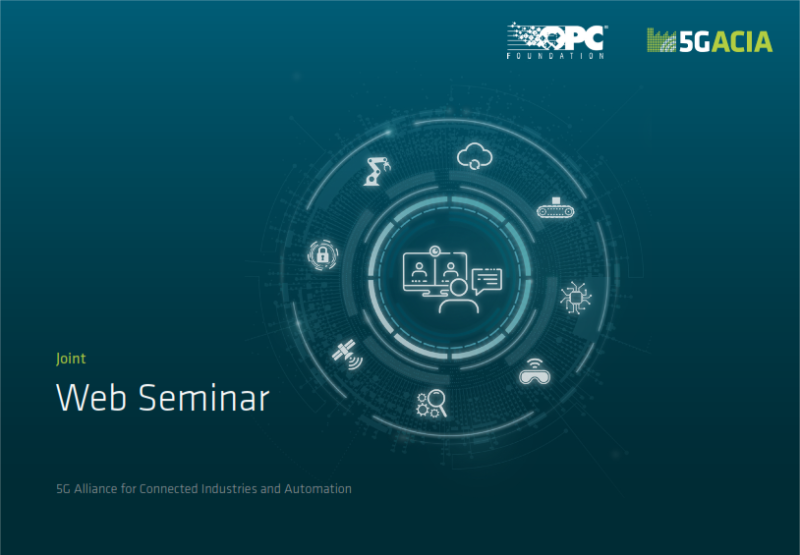Everything is Moving – OPC UA Companion Specification “Global Positioning”

Everything is moving – this expression best describes the dynamics in production and logistics today. Products, robots, autonomous vehicles, and humans in between. To ensure a smooth production flow in such a mobile environment, machines and software systems need a common understanding of the positions of things in space.
Some associations have already dedicated themselves to the aspects of “location and positioning” in the past. Some OPC UA Companion Specifications already contain data descriptions in this regard. Coming from the aspect of identification, the association AIM-D e.V. published an OPC UA Companion Specification AutoID. The location standard omlox from PROFIBUS & PROFINET International (PI) allows seamless and technology-independent provision of location data in production and logistics.
The three associations have now joined forces to form a joint working group to develop a new OPC UA Companion Specification “Global Positioning”. The goal of the Companion Specification is to define geometric positions in space on a local and global level to ensure a seamless transition between production, intralogistics and logistics. It completes existing Companion Specifications with the aspect of positioning and allows location data from omlox systems to be easily further processed within the OPC world and refined with additional data.
“Interoperability is not only necessary between manufacturers, but also between standards,” says Dr. Matthias Jöst – Committee Leader for omlox – within PI. “In particular in the exchange between different communities, many synergies and new potentials arise.”
Joint Consortium Standardizes Common “Power Consumption Management” for the Shop Floor

A key objective of the future mechanical and plant engineering sectors is to achieve climate-neutral production. This is backed up by the European Union’s “European Green Deal”, which aims to make Europe climate-neutral by 2050. To achieve this goal, and to implement many other use cases, energy consumption data in production is an important prerequisite.
ODVA, OPC Foundation, PI, and VDMA founded the “Power Consumption Management” group in May 2022. In this group, the OPC UA interface standard for energy consumption data is being developed.
Karsten Schneider, Chairman of PI, is looking forward to cooperation with the ODVA, the OPC Foundation, and VDMA: “The acquisition and analysis of energy consumption in machines and plants is an immensely important topic for the future.”
“The four organizations are working at full speed to harmonize and standardize energy consumption information on the shop floor,” says Andreas Faath, head of VDMA Machine Information Interoperability Department. “With this, a crucial building block, supporting the goal of global climate-neutral production in all sectors of the machinery and plant engineering industry, is under development.”
“Rapid transition to environmentally-sustainable energy use is the greatest challenge of our time and, as such, I am glad that we are proceeding together: PI and ODVA contributing their in-depth know-how on energy interfaces at the field level, with the internationally recognized OPC UA data modelling standard defining semantics and secure data transport, serving as the foundation of the Global Production Language developed by the VDMA”, says Stefan Hoppe, President OPC Foundation.
“ODVA is pleased to be an active contributor to this key initiative to optimize energy usage and thereby reduce the detrimental impact on the environment from waste,” said Dr. Al Beydoun, President and Executive Director of ODVA. “This Power Consumption Management collaboration will help ensure end-users have a highly standardized and interoperable means to reach their environmental, social, and corporate governance (ESG) goals.”
The results of the working group will be published as a new OPC UA specification. Future releases of the OPC UA for Machinery specification will leverage these results, ensuring that energy information from all machines and components on the shop floor can be provided in a standardized way as part of the Global Production Language.
“The activity is based, in particular, on the existing standards of the participating organizations; but also on other standards from the OPC Foundation, the VDMA, and external research,” says Heiko Herden, VDMA and elected chairperson of the new joint working group. “In combination with other OPC UA for Machinery use-cases, such as status monitoring or job management, the calculation of the product and production-specific carbon footprint will be possible,”
Within the VDMA, over 600 member companies develop the Global Production Language. OPC UA Companion Specifications, for numerous sectors of the mechanical and plant engineering industry, are being created by an additional 40 working groups. The basic specification, “OPC UA for Machinery,” is a special case. Here, important building blocks are defined across all domains. Other specifications can be based on these building blocks.
Interoperable Industrial 5G and OPC UA on the Shop Floor – an Absolute Prerequisite for Industry 4.0
Joint Web Seminar on Industrial 5G with OPC UA on June 22, 2022 – online via WebEx
The fourth stage of the industrial revolution heralds an entirely new era. Its goal is to significantly improve the flexibility, versatility, usability and efficiency of production systems and to make the vision of smart factories come true.
In this context, the integration of OPC UA and Industrial 5G, two important building blocks are brought together, thus forming the basis for a highly flexible and powerful connectivity fabric for smart manufacturing.
Learn in our breakout sessions more from the experts on how both technologies will revolutionize the shop floor.
Please see our flyer for more information: Joint Web Seminar on Industrial 5G with OPC UA by 5G-ACIA and OPC Foundation
